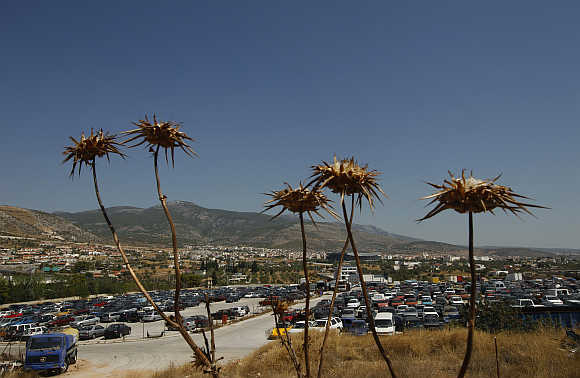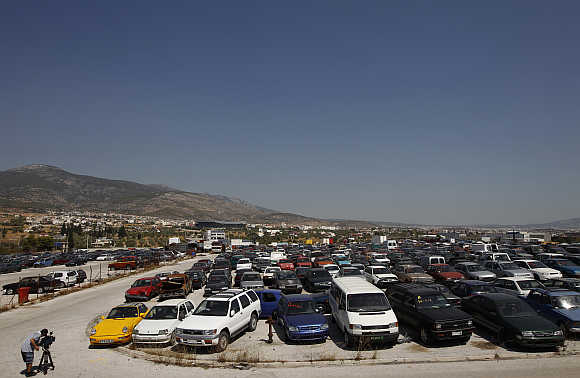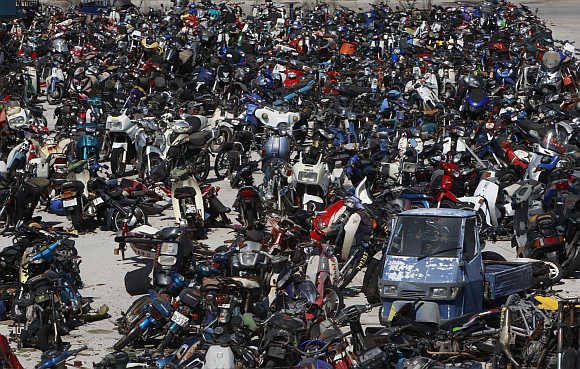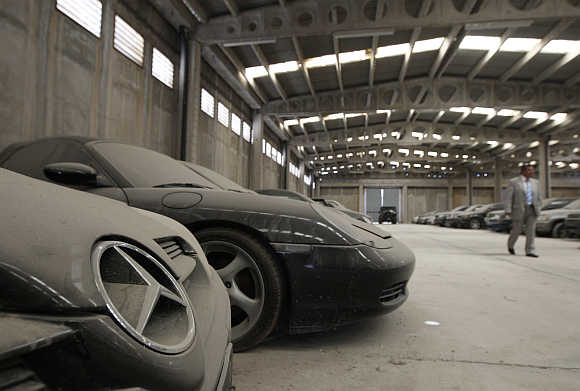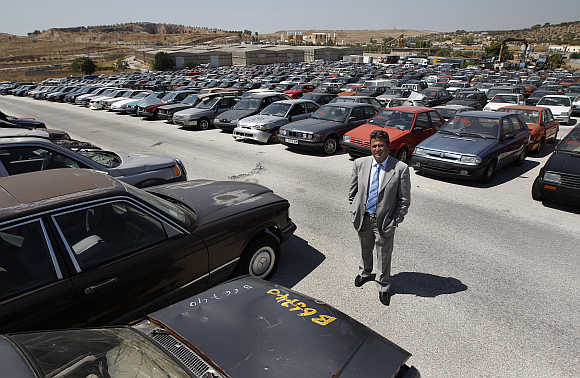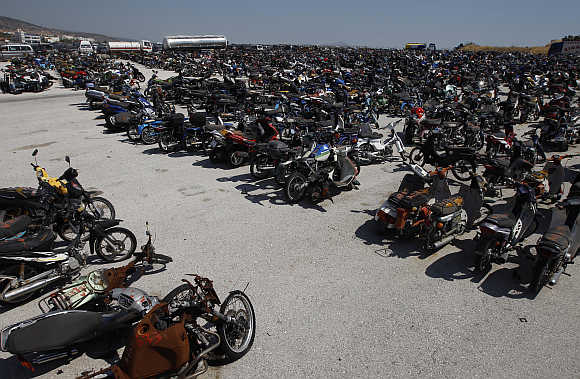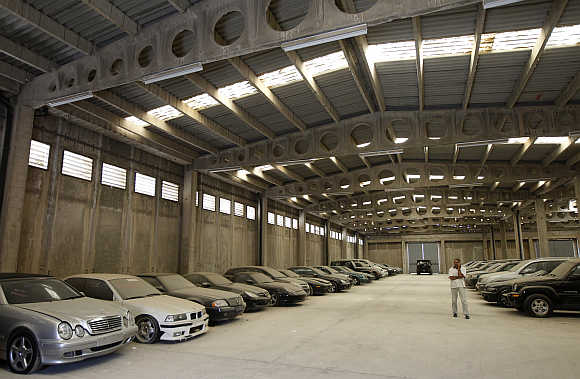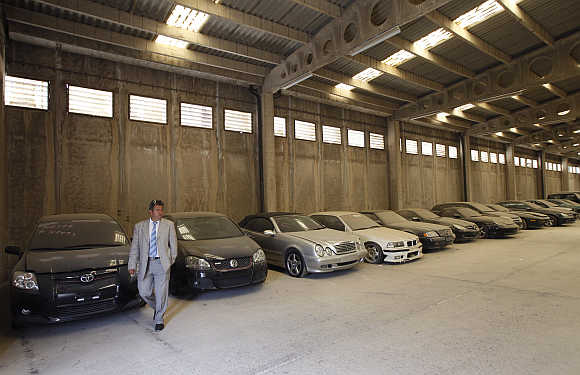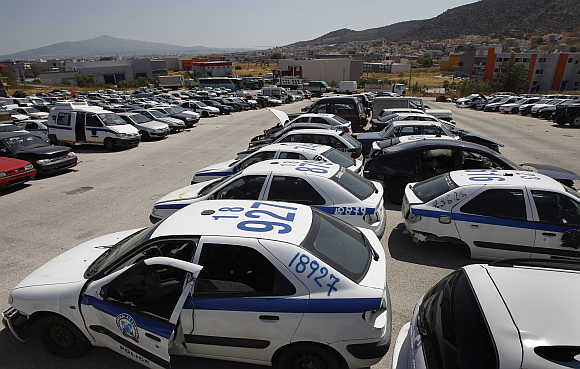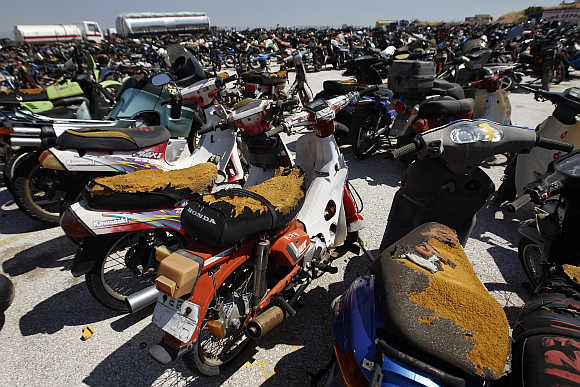 | « Back to article | Print this article |
Greece's slowdown hits even scrap business
Greece is going through one of the toughest economic crises it has ever witnessed. The country is facing huge unemployment, the growth rate is in negative and businesses are struggling to stay afloat.
Let's take a look at how bad the situation is in Greece by looking at a scrapyard that itself is about to become a scrapheap.
Click NEXT to read more...
Greece's slowdown hits even scrap business
Oddy, the Public Property Management Organisation, in Athens, ran warehouses nationwide that auctioned off anything from old sofas discarded from city hall waiting rooms to luxury cars confiscated from drug dealers.
Now, efforts to consign Oddy itself to the scrapheap, along with its loss-making payroll costs, show just how hard it is for the Greek government to satisfy foreign creditors' demands that it shut down dozens of state agencies to save money.
Click NEXT to read more...
Greece's slowdown hits even scrap business
The country's economy was devastated by the Second World War, and the high levels of economic growth that followed throughout the 1950s to 1970s are dubbed the Greek economic miracle. Since the turn of the millennium, Greece saw high levels of GDP growth above the Eurozone average peaking at 5.9 per cent in 2003 and 5.5 per cent in 2006.
Due to the late-2000s financial crisis and the European sovereign debt crisis, the Greek economy saw growth rates of -7.1 per cent in 2011, -4.9 per cent in 2010, -3.1 per cent in 2009 and -0.2 per cent in 2008.
Click NEXT to read more...
Greece's slowdown hits even scrap business
In 2011, the country's public debt stood at 355.658 billion euros (170.6 per cent of nominal GDP). After negotiating the biggest debt restructuring in history with the private sector, Greece reduced its sovereign debt burden to 280 billion euros (136.9 per cent of GDP) in the first quarter of 2012.
Click NEXT to read more...
Greece's slowdown hits even scrap business
By the end of 2009, the Greek economy (based on data revised on November 15, 2010, in part due to reclassification of expenses) faced the highest budget deficit and government debt to GDP ratios in the EU.
The 2009 budget deficit stood at 15.4 per cent of GDP. This, and rising debt levels (127 per cent of GDP in 2009) led to rising borrowing costs, resulting in a severe economic crisis.
Click NEXT to read more...
Greece's slowdown hits even scrap business
Greece was accused of trying to cover up the extent of its massive budget deficit in the wake of the global financial crisis.
This resulted from the massive revision of the 2009 budget deficit forecast by the new Socialist government elected in October 2009, from 6-8 per cent (estimated by the previous government) to 12.7 per cent (later revised to 15.4 per cent).
Click NEXT to read more...
Greece's slowdown hits even scrap business
However, the degree to which the new figure was accurate is questionable, and the Hellenic Parliament voted in favour of an investigation on the case on February 23, 2012, after accusations by a former member of the Hellenic Statistical Authority that the deficit had been artificially inflated to justify harder austerity measures.
Click NEXT to read more...
Greece's slowdown hits even scrap business
Greek labour force, which totals about five million, works the second-highest number of hours per year on average among Organisation for Economic Co-operation and Development countries, after South Korea.
Click NEXT to read more...
Greece's slowdown hits even scrap business
Groningen Growth & Development Centre has published a poll revealing that between 1995 and 2005, Greece was the country whose workers worked the most hours/year among European nations; Greeks worked an average of 1,900 hours per year, followed by Spaniards (average of 1,800 hours/year).
Click NEXT to read more...
Greece's slowdown hits even scrap business
As a result of the on-going economic crisis, industrial production in the country went down by eight per cent between March 2010 and March 2011.
Click NEXT to read more...
Greece's slowdown hits even scrap business
Between 2008 and 2012 unemployment skyrocketed, from a generational low of 7.2 per cent in the second and third quarters of 2008 to a high of 26.8 per cent in October 2012, leaving over a million jobless. Youth unemployment peaked at 58 per cent in August 2012.
Click NEXT to read more...
Greece's slowdown hits even scrap business
A recent OECD annual Taxing Wages report found that, in absolute figures, the average gross income in Greece fell from 20,457 euros in 2010 to 15,729 euros in 2011, equivalent to a real decline of 25.3 per cent, taking into account rate of inflation.
Click NEXT to read more...
Greece's slowdown hits even scrap business
The financial crisis - particularly the austerity package put forth by the EU and the IMF - has been met with anger by the Greek public, leading to riots and social unrest.
Despite the long range of austerity measures, the government deficit has not been reduced accordingly, mainly, according to many economists, due to the subsequent recession. Consequently, the country's debt to GDP continues to rise rapidly.

